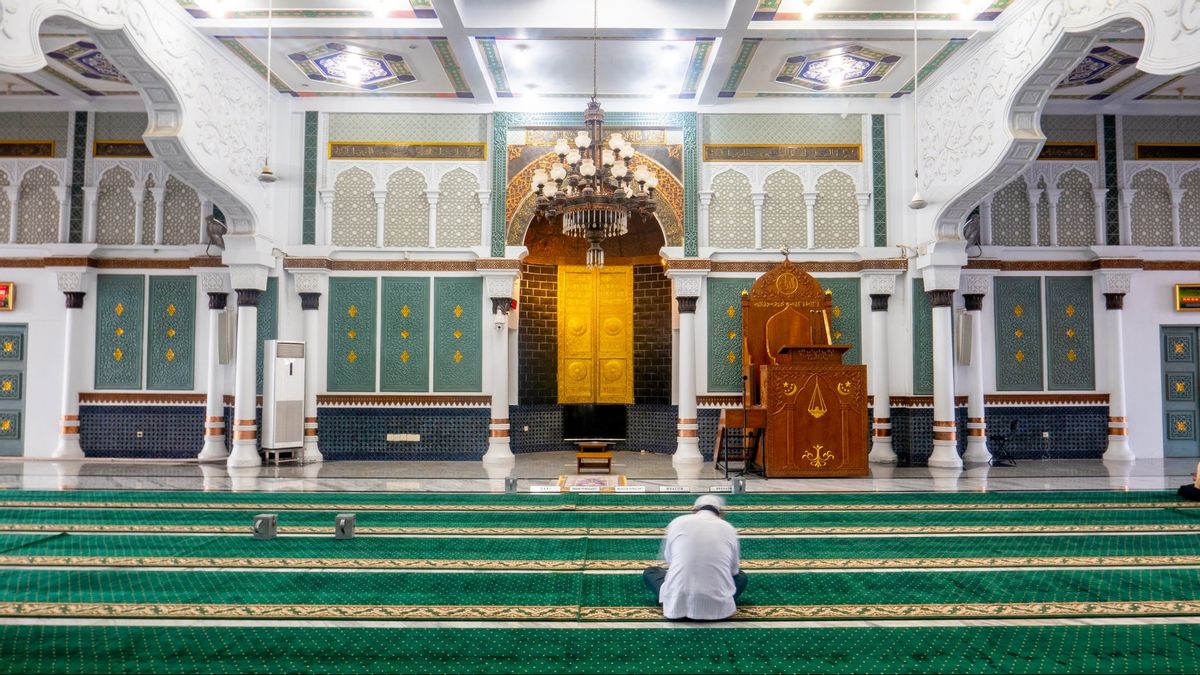JAKARTA - One of the privileges that Allah has given to the people of Prophet Muhammad SAW compared to the other is the night of Lailatul Qadar, or known as a night worth a thousand months.
According to Muhammad Abror's writings published on nu.or.id, in the book Ahkamul Qur'an, Ibn 'Arabi (1165-1240 AD) explained by quoting the opinion of Al-Qadli,
“Indeed, the ummah of Muhammad SAW has received an award that will not be given to another ummah forever. Namely: First, perform the five daily prayers with a reward of fifty times the prayers. Second, fasting the month of Ramadan is rewarded by fasting for one year. Third, the zakat is enough for a quarter of a tenth. Fourth, reading the end of Surat al-Baqarah is like a full night of worship. Fifth, the reward of the Subuh prayer is like a full night of worship. Sixth, the reward of Isha prayer is like lighting up the midnight. Seventh, an incomparable gift, which is the night of Lailatul Qadar which is more important than 1000 months." (See Ahkamul Qur'an in Ibn 'Arabi, vol. 4, p. 428).
Ibn 'Arabi also quoted Imam Malik's explanation in al-Muwattha, mentioning the narration of Ibn Qasim and others,
سمعت من أثق به يقول: إن رسول الله صلى الله عليه وسلم أري أعمار الأمم قبله, فكأنه تقاصر أعمار أمته ألا يبلغوا من العمل مثل ما بلغ غيرهم في طول العمر, فأعطاه الله ليلة القدر, وجعلها خيرا من ألف شهر.
Meaning, "I heard a trusted person say," Indeed, the Prophet SAW was once shown the age of the previous ummah. (Seeing that) The Prophet was pessimistic that the age of his people would not be able to achieve the deeds of worship performed by those people. Then Allah SWT gave the Prophet (and his people) the night of Lailatul Qadar which is more important than a thousand months." (See Ahkamul Qur'an in Ibn 'Arabi, vol. 4, p. 428).
What is explained by Ibn 'Arabi above is very clear, the Shari'ah of the people of the Prophet Muhammad SAW is such a perfect Shari'ah. It has advantages that the previous peoples did not have. Among the advantages is the night of Lailatul Qadar which excellence is unmatched.
So, when exactly did the night of Lailatul Qadar happen?
We can't be sure when exactly that night arrived. Because Allah SWT did keep it a secret. However, we can still predict it through the opinion of existing scholars. On this occasion, the author would like to present the opinion of Ibn Hajar Al-Asqalani (1372-1449 AD). One of the leading hadith scholars of the Shafi'i school.
According to Ibn Hajar, regarding the time of the night of Lailatul Qadar, there are many opinions, each opinion with its argument. Ibn Hajar in Fathul Bari mentions that there are 45 opinions on the determination of the night of Lailatul Qadar.
However, according to Ibn Hajar, of the 45 opinions, the most superior (rajih) is the opinion that says that the night of Lailatul Qadar occurs on an odd date from the last 10 nights of Ramadan. The fall at night is different each year.
Of those odd dates, the most potential is the 21st and 23rd of Ramadan. As the opinion of Imam Shafi'i. While according to the majority of scholars is the night of the 27th of Ramadan. (See Fathul Bari, juz 5, p. 569)
Here the author presents the arguments that underlie Ibn Hajar's argument. Opinions that say the night of Lailatul Qadar is on an odd date from the last 10 nights of Ramadan. Here's the proof,
وعن عائشة رضي الله عنها, قالت: كان رسول الله - صلى الله عليه وسلم - يجاور في العشر الأواخر من رمضان, ويقول: «تحروا ليلة القدر في العشر الأواخر من رمضان».
Meaning, “From Aisyah ra, that Rasulullah SAW. said: 'Seek the lailatul qadar in the night of the last ten days of Ramadan." (Muttafaq 'alaih).
Supported by the following hadith, وعنها ري الله عنها: أنَّ رسولَ اللهِ - صلى الله عليه وسلم - قَالَ: رواه البخاري.
Meaning, "From 'A'ishah, may Allah be pleased with her, that the Prophet (peace and blessings of Allaah be upon him) said:' Look for Lailatul Qadar in the odd night of the last ten days of Ramadan. ' (HR. Bukhari).
On the basis of the two hadiths above, Ibn Hajar excels in the opinion that says that the night of Lailatul Qadar occurs on the last ten nights of Ramadan. Exactly on odd date nights.
Next, the opinion that says happened on the 23rd of the month of Ramdhan. This opinion is supported by Imam Shafi'i. In a hadith explained, one of the companions of the Prophet named Abdullah bin Unais asked about the night of Lailatul Qadar,
O Messenger of God, to the end of this world, the Lord of lords.
Meaning, "O Messenger of Allah, when can we get this night full of blessings?"
The Messenger of Allah replied,
الْتَمِسُوهَا هَذِهِ اللَّيْلَةَ) وَقَالَ وََلِكَ مَسَاءَ لَيْلَةِ َلَا وَعِشْرِينَ)
Meaning, "Seek tonight (the night of 23 Ramadan)".
Furthermore, the opinion that says happened on the night of the 27th month of Ramdhan. This is the opinion of the majority of scholars. The basis of his argument is based on the following principles of Ubay bin Ka'ab,
عن أبي بن كعب: (والله إني لأعلمها وأكثر علمي هي الليلة التي أمرنا رسول الله صلى الله عليه وسلم بقيامها, هي ليلة سبع وعشرين
Meaning, "From Ubay ibn Ka'ab: 'By God, I really know the night (Lailatul Qadar). The peak of my knowledge is that that night is the night that the Prophet SAW ordered us to perform prayers on him, which is the 27th night." (Narrated by Muslim).
While the opinion that says uncertain, in the sense of moving around every year, not just the 23rd or 27th only, based on many histories. Where each narration says the 21st, 23rd, 27th, and 29th. It is too long for the author to mention one by one the propositions.
Then, what is the secret wisdom of this Lailatul Qadar night?
Still according to Ibn Hajar. In his Fathul Bari, he explained, that the secret wisdom of the night of Lailatul Qadar is for Muslims to be earnest in trying to obtain it with sincerity of worship. Different if it is determined on such a date, worrying about the sincerity of his worship only that night. (See Fathul Bari, juz 5, p. 155)
The English, Chinese, Japanese, Arabic, and French versions are automatically generated by the AI. So there may still be inaccuracies in translating, please always see Indonesian as our main language. (system supported by DigitalSiber.id)












